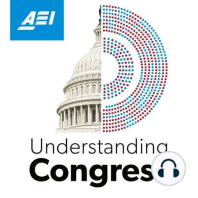25 min listen

What Is Congressional Capacity, and Why Does It Matter? (with Kevin Kosar)
What Is Congressional Capacity, and Why Does It Matter? (with Kevin Kosar)
ratings:
Length:
20 minutes
Released:
Dec 4, 2023
Format:
Podcast episode
Description
The topic of this episode is, “What is congressional capacity, and why does it matter?”As regular listeners know, almost inevitably I have a guest on my show. But this episode, you get just me. The reason is simple: I have been working on congressional capacity for years, and I would like to share my thoughts and hear your feedback.Kevin Kosar:Welcome to Understanding Congress, a podcast about the first branch of government. Congress is a notoriously complex institution and few Americans think well of it, but Congress is essential to our republic. It’s a place where our pluralistic society is supposed to work out its differences and come to agreement about what our laws should be, and that is why we are here to discuss our national legislature and to think about ways to upgrade it so it can better serve our nation. I’m your host, Kevin Kosar, and I’m a resident scholar at the American Enterprise Institute, a think tank in Washington D.C.It is probably not news to you that the American public is not pleased with Congress. According to Gallup, fewer than 8 in 10 Americans approve of the job Congress is doing. For sure, part of the dourness is not really about Congress. People are annoyed because what media they see on Congress focuses heavily on conflict and crazy behavior by legislators. The news rarely covers instances of Congress doing good things.That said, it is still fair to say that Congress is not doing well. Most obviously, it has failed to tackle some of the biggest problems facing the nation, like immigration, and often sits back and lets the executive branch and courts wade into these issues. Which is not how our system is supposed to work. So what is wrong with Congress?Many scholars, media, and members of the public diagnose the ills of Congress think in terms of the Three P’s: People, parties, and polarization.It’s Kevin McCarthy’s fault; it’s Chuck Schumer’s fault. If we had better people, we would have a better Congress.Others point to the parties. The Democrats are out-of-touch liberals. The Republicans are proto-authoritarians. The Democrats and Republicans have sorted into ideologically conformist enterprises. Gone are the days when we had liberal Republicans and conservative Democrats.Still others emphasize polarization as the cause for Congress’ failures. We are a nation of red and blue voters and states, so Congress itself is polarized. Gridlock and fighting is the result of Americans being grossly in disagreement with one another.There is some truth to all these contentions. But these explanations have their own shortcomings.Critically, the Three P’s ignore an important unit of analysis: the institution itself.The U.S. Congress is an organization—a firm. Like any firm—a business firm, a school, or a music band, Congress’ performance is greatly affected by its capacity. It can only do as much as it is capable of doing.In the congressional context, capacity can be defined as “the human and physical infrastructure Congress needs to resolve public problems through legislating, budgeting, holding hearings, and conducting oversight.” Some specific aspects of congressional capacity are its funding, its processes for executing tasks (e.g., how bills go to the floor), its technology for completing its work, how it internally organizes itself, its leadership structure, and its people. So that is the framework I and my coeditors and coauthors adopted. And this lens for looking at Congress has proven illuminating. What you see is an institution that has experienced escalating demands upon it...
Released:
Dec 4, 2023
Format:
Podcast episode
Titles in the series (45)
Do we need a Congress? (with Phil Wallach) by Understanding Congress